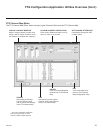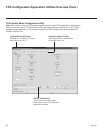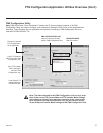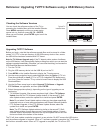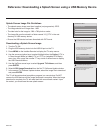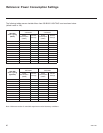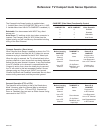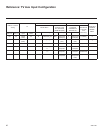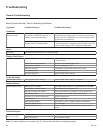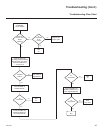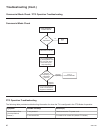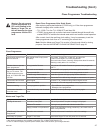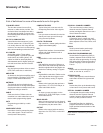
48
206-4185
75 OHM RF CABLE
The wire that comes from an off-air
antenna or cable service provider. The
end looks like a hex-shaped nut with a
wire through the middle. It screws onto
the Antenna/Cable threaded jack on the
back of the TV.
300 TO 75 OHM ADAPTER
A small device that connects a 2-wire
300 ohm antenna to a 75 ohm RF jack.
It is usually about an inch long with two
screws on one end and a round opening
with a wire extending out the other end.
A/V CABLES
Audio/Video cables. Three cables
bunched together —right audio (red), left
audio (white), and video (yellow). A/V
cables are used for stereo playback of
videocassettes and for higher quality pic-
ture and sound from other A/V devices.
A/V DEVICE
Any device that produces video or sound
(VCR, DVD, cable box, or television).
AMPLIFIER
An electronic device that amplies sound
from a television, CD player, VCR, DVD
player, or other Audio/Video device.
ANTENNA
The physical receiver of television sig-
nals sent over the air. A large metal piece
of equipment does not always have to be
visible to be using an antenna.
CABLE
Cable service box. Refers to the de-
scrambler box cable subscribers use to
receive cable programming signals.
CATV
Programming provided by a cable
service.
COMPONENT VIDEO
Uses three wires for transporting three-
color video signals. The end result is
usually better video quality.
COMPOSITE VIDEO
Typical video jack, uses one wire for
transporting three-color video signals.
DELETE
Lets you remove channels from the list
that the end user can scroll through
using Channel Up/Down.
DIGITAL TELEVISION
High-resolution, cinema-quality television
signals transmitted digitally.
DVI
Digital Video Interface. Accommodates
analog and digital interfaces with a
single connector.
HDMI
High-denition multi-media interface.
HDSTB
High-denition set top box. Refers to a
tuner device that receives high-denition
television signals which have higher res-
olution than ordinary analog TV signals.
HDTV
High-denition television. Refers to tele-
vision signals that have higher resolu-
tion than ordinary analog TV signals.
INPUT
Refers to the input jack that receives a
signal from a TV, VCR, DVD Player, or
other Audio/Video device.
JACK
An input or output connector on the
back of a TV, VCR, DVD Player, or other
Audio/Video device.
MONO SOUND
Mono (monaural) sound is one channel
of sound. On more than one speaker, all
the speakers play the same audio.
OUTPUT
Refers to the output jack that sends a
signal out of a VCR, DVD, or other A/V
device.
PHYSICAL CHANNEL NUMBER
The actual channel number. Analog
channels use the Physical Channel
number and digital channels can use a
Virtual Channel number.
RGB (RED, GREEN, BLUE)
Connection input or output port avail-
able for producing a video image using
three separate colors: Red, Green, and
Blue.
RS-232
Serial communication port through
which rmware is downloaded.
2ND AUDIO PROGRAMMING/SAP
Second Audio Programming (SAP) is
another, separate audio channel avail-
able with some programming. Choosing
SAP often refers to listening to audio in
another language, such as Spanish or
French.
SIGNAL
Picture and sound traveling through a
cable, or over the air, to the TV.
STEREO SOUND
Stereo (Stereophonic) sound refers to
audio that’s divided into right and left
sides.
TUNER
Device that picks up the broadcast sig-
nal and turns it into picture and sound.
VIRTUAL CHANNEL NUMBER
A re-mapped channel number. Analog
channels use the Physical Channel
number; however digital channels use a
Virtual (or false) Channel number.
XDS
Extended Data Service. Additional
program information included on the
signal provided at the discretion of the
broadcaster.
Note: Refer to www.atsc.org for further
information.
Glossary of Terms
A list of denitions for some of the words found in this guide.



